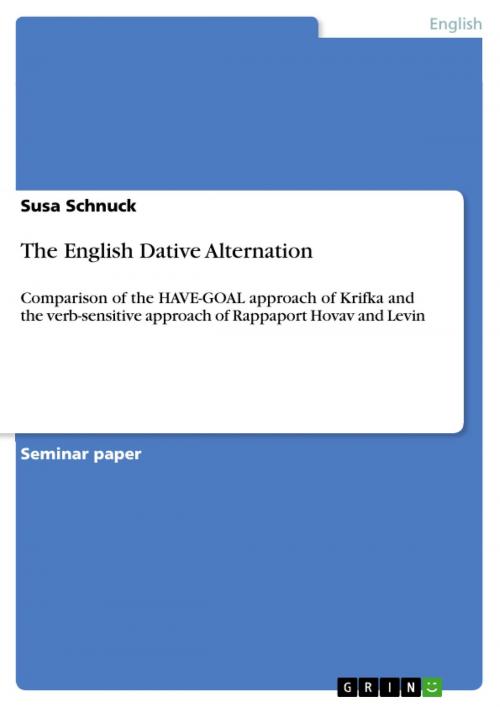The English Dative Alternation
Comparison of the HAVE-GOAL approach of Krifka and the verb-sensitive approach of Rappaport Hovav and Levin
Nonfiction, Entertainment, Drama, Anthologies| Author: | Susa Schnuck | ISBN: | 9783656916352 |
| Publisher: | GRIN Verlag | Publication: | March 10, 2015 |
| Imprint: | GRIN Verlag | Language: | English |
| Author: | Susa Schnuck |
| ISBN: | 9783656916352 |
| Publisher: | GRIN Verlag |
| Publication: | March 10, 2015 |
| Imprint: | GRIN Verlag |
| Language: | English |
Seminar paper from the year 2014 in the subject English Language and Literature Studies - Linguistics, grade: 2,0, Humboldt-University of Berlin (Anglistik), course: Dative Alternation, language: English, abstract: Would you say you '...gave a stranger your phone number' or does '...gave your phone number to a stranger' sound better? In essence, this termpaper is trying to analyse this question. The grammatical phenomenon underlying which decribes those two constructions - the double object dative [a stranger] [your phone number] and the prepositional object dative [your phone number] [to a stranger] - is the so-called dative alternation. The term dative alternation has the ability to express the same event of giving with two specific structures, as shown above. The following paper will focus on the approaches of Krifka and Rappaport Hovav and Levin. At first, a definition of dative alternation will be given. Important facts, examples and a list of verbs, which allow or do not allow dative alternation, will be provided to give an overview of the topic. This term paper will also respond to the differences between the dative alternation and the benefactive alternation and will afterwards compare the two approaches on dative alternation. The main ideas of Krifka's 'Semantic and Pragmatic Conditions for the Dative Alternation' (2003) and Rappaport Hovav's and Levin's 'The English dative alternation: The case for verb sensitivity' (2008) will be presented and compared. Last but not least, I am going to introduce brief thoughts of dative alternation in the German language and how it is connected to the English dative alternation.
Seminar paper from the year 2014 in the subject English Language and Literature Studies - Linguistics, grade: 2,0, Humboldt-University of Berlin (Anglistik), course: Dative Alternation, language: English, abstract: Would you say you '...gave a stranger your phone number' or does '...gave your phone number to a stranger' sound better? In essence, this termpaper is trying to analyse this question. The grammatical phenomenon underlying which decribes those two constructions - the double object dative [a stranger] [your phone number] and the prepositional object dative [your phone number] [to a stranger] - is the so-called dative alternation. The term dative alternation has the ability to express the same event of giving with two specific structures, as shown above. The following paper will focus on the approaches of Krifka and Rappaport Hovav and Levin. At first, a definition of dative alternation will be given. Important facts, examples and a list of verbs, which allow or do not allow dative alternation, will be provided to give an overview of the topic. This term paper will also respond to the differences between the dative alternation and the benefactive alternation and will afterwards compare the two approaches on dative alternation. The main ideas of Krifka's 'Semantic and Pragmatic Conditions for the Dative Alternation' (2003) and Rappaport Hovav's and Levin's 'The English dative alternation: The case for verb sensitivity' (2008) will be presented and compared. Last but not least, I am going to introduce brief thoughts of dative alternation in the German language and how it is connected to the English dative alternation.















